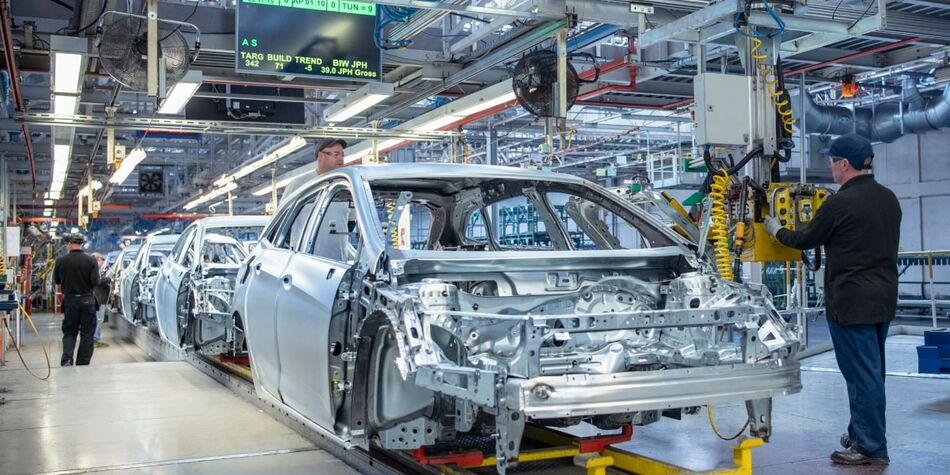Why is a Custom Automotive ERP Solution Better for Manufacturers?

The role of ERP software in the automotive industry is obvious – it’s at the very heart of the state-of-the-art and efficient business. A decade or two ago, ERP systems were mainly used by large enterprises, but nowadays medium-sized and small businesses increasingly use ERP software in their workflows. And, of course, there are lots of ready-made solutions on the market right now, but what if you need a radically atypical solution? Read about the reasons to build a custom ERP system for automotive manufactures.
The automotive industry resembles a giant Kraken (or a neural network), connecting to a raft of related economic sectors that are the source of everything necessary to make and sell passenger cars and heavy vehicles. Every single part of the pipeline, from concept development and the supply of raw materials to forwarding finished vehicles to a warehouse, must perfectly align. Suppliers must know where and when their resources are needed at the factory to support a seamless manufacturing process. And no less important, the end product must be shipped to dealers to reach consumers in a timely fashion. This mechanism must work like a Swiss chronometer watch.
Specialized software solutions for automotive are necessary to manage auto manufacturing companies and automate many back-office functions related to IT technologies, services, and human resources.
What is ERP?
ERP stands for Enterprise Resource Planning, i.e. real-time management of core business processes using software and technology. ERP is the key to addressing the issue described above.
Typically, automotive ERP software is a suite of integrated applications that automotive manufacturers use to collect, store, manage, and interpret data from the activities of their numerous business units. These activities usually include product and production planning, manufacturing, materials and inventory management, marketing and sales, and shipping and payment.
In the automotive industry, enterprise resource planning ensures a comprehensive and up-to-date view of core business processes using databases. ERP software can track your business’s resources – financial, manpower, raw materials, and production capacity – and monitor the status of your commercial undertakings, such as purchase orders, customer orders, and company payroll. Such software also facilitates information sharing across numerous business functions of auto manufacturers (manufacturing, procurement, sales and marketing, corporate performance, accounting, and so on) and connections to stakeholders outside the company.
How Can Automotive Manufacturing Software Facilitate Industry Best Practices?
Today, automakers have to adapt to extremely dynamic business environments and collaborate across supply chains that are usually dispersed around the globe. Real-time updates with the help of mobile devices are now the norm for everyday business management. A global supply chain means that streamlining organizational processes depends on certain features of an ERP, such as multi-plant inventories; various features related to visibility, particularly over subcontractor and third-party logistics (3PL); business information sharing to outsourcing partners (subcontract purchase orders, etc.); and tracking of shipments.
ERP systems in the automobile industry provide the most effective way to perform each business process, as most ERP systems incorporate best practices. ERP solutions allow your employees to work more efficiently and remove barriers between business units.
Advantages of ERP Systems
Better planning and execution. No more blind production, as your company will always produce the right amount of goods while having all necessary raw materials and tools on hand. This minimizes storage costs and improves logistics. Real-time data and close resource monitoring help to meet strict timelines and ensure high quality.
Improved records and document management. No more different software for different processes and papers varying paperwork across the company. A paperless environment is a trend in the industry. The storage and maintenance of paper documents introduce extra costs and, in many cases, are outsourced. When dealing with electronic documents, you can be sure your documents are up-to-date, traceable, accessible, and safe. Passwords and role-based access are all you need to keep your documentation safe and in one location.
Better financial control and better decision making. No more losses of time due to inefficient data collection and reporting. All key performance metrics are available in real-time and are ready for almost instant analysis.
Improved customer service. No more lost inquiries and missed orders. All sales, inventory, and customer data are maintained in one place. In the ideal situation, customers can simply go online to their personal accounts and view their order statuses.
Here’s another fact in support of ERP systems:
ROI is a metric that can be very convincing. KNOWARTH’s experts say that organizations with an integrated ERP solution in place receive maximum returns on investment.
The statistics data portal Statista forecasts that the size of the enterprise resource planning software market worldwide is growing constantly. In 2015, the ERP software market was valued at 82.1 billion US dollars globally. More specifically, the cloud ERP software market will be worth 28.8 billion US dollars by 2022.
Want to know more about ERP solutions on the market?
Top ERP Systems for Automotive Manufacturing
When it comes to the IT industry, people usually think of primary vendors. However, ERP systems are a very special area of IT. Of course, there are some vendors that are familiar to everyone, but it’s safe to say that the market for ERPs is more of a niche market, as the needs of manufacturers in specific industries vary a lot.
In an interview for Enterprise Apps Today, Andrew Marder, ERP analyst at Capterra, says “Beyond the top few, the rest of the world is made up of ERPs that are designed for a very specific niche or a very specific budget.”
First, we’ll focus on some ERP solutions provided by top-tier vendors and try to find out their pros and cons. In this article, we compare only five manufacturing ERPs for the automobile industry based on data provided by top10erp.org. Let’s get to work and learn more about the features of these products.
Plex Manufacturing Cloud is a web-based, on-demand solution designed to capture manufacturing data and control manufacturing processes.
Key features:
- MRP (manufacturing resources planning)
- Production scheduling
- Quality management
Price: $5K+ per month
Users: 20–1,000+
Architecture: SaaS Multi-Tenant SOA
Pros: Easy to use. Price is lower than for big ERP software systems. Always up-to-date. Customizable.
Cons: Clunky functionality and some limitations for consumer product manufacturers. Current business intelligence tools are hard to use.
Microsoft Dynamics is a line of integrated, adaptable business management solutions that automate and streamline financial, human resources, and operational management. There are also industry-specific capabilities for distributors, retailers, manufacturers, and service providers.
Key features:
- Account management
- Billing and invoicing
- Expense tracking
- Fixed asset management
- Project accounting
- Tax management
Price: $20–750K
Users: 5–2,250
Architecture: SOA, .NET, Cloud
Pros: Easy to get the necessary information and navigate features. A large number of features available. Customizable. Good support system. Offline access is a pro for sure.
Cons: UI/UX isn’t intuitive for non-technical users. Primarily oriented to the sales side. High price per seat. The software needs to be updated frequently, and a trial is difficult to find.
IFS is a component-based extended ERP suite built on SOA technology. The software streamlines four core strategic processes: service and asset management, manufacturing, supply chain, and projects.
Key features:
- Accounting management
- CRM system
- Distribution management
- Enterprise asset management
- Financial management
- HR management
- Inventory management
- Project management
- Purchasing
- Sales management
- Supply chain management
Price: $300K–2M
Users: 40–5,000
Architecture: SOA
Pros: Lots of different features. Intuitive interface. Allows some customization.
Cons: Lack of specific features for industry-oriented tasks. No online community; user reviews push for better support.
SYSPRO is a highly scalable, industry-built ERP software solution designed for manufacturers and distributors. This ERP is deployed in the cloud or on-premise and can be accessed via any mobile device.
Key features:
- Import/export management
- Inventory management
- Order management
- Purchasing
- Returns management
- Sales forecasting
- Shipping management
- Warehouse management
Price: $25–500K on-site
Users: 4–1,000
Architecture: SOA, XML, Webservice
Pros: Relatively low cost, feature lite, and good for small businesses. Easy to use. Includes standard trackers for inventory and process planning. Can be customized.
Cons: UI should be more intuitive. Requires a lot of customization to retrieve common data and needs more default settings.
IQMS ERP Software is designed for repetitive and batch process manufacturers. This solution provides cross-department communication, real-time manufacturing, accounting, and supply chain management.
Key features:
- Accounting management
- CRM system
- Distribution management
- Enterprise asset management
- Financial management
- HR management
- Inventory management
- Project management
- Purchasing management
- Sales management
- Supply chain management
- Warehouse management
Price: $50K–2M
Users: 5–Unlimited
Architecture: SOA, .NET
Pros: Feature-rich, one-source solution for manufacturing. Good visualization and color-coding. Strong support, including community support. Highly adaptable.
Cons: Not very user-friendly. The interface is very complex and requires training to use it effectively. Expensive: high initial costs, annual support, and maintenance costs, plus additional training costs. The report feature usually needs to be customized. Some features are designed for very specific manufacturers and are not necessary for the majority of enterprises.
The bottom line is that ERP software for the automotive industry is usually expensive, and provides tons of features and capabilities. The trends in enterprise ERPs are usually slow to change – some enterprises use ERP systems that were developed 10 or 20 years ago. However, this sector of IT has experienced a fundamental shift recently. The ERP sector is becoming more responsive to technology developments and current IT trends. The most recent trends are mobile features that provide real-time access to information, cloud storage, and even the use of social media packages in ERPs.
The goal of every ERP is to save your business money. Taking into account the cost of these solutions, that sounds strange, doesn’t it? But it’s true. Best-of-breed ERP systems consolidate the software systems your organization already uses. An ERP solution is like a connector: it creates a single interface that incorporates every feature necessary to manage product development, finances, supply chain, customer relationships, inventory, and much more.
What Are the Must-have Features of an ERP Solution?
The features of automotive ERP solutions are tied to the organizational system and business processes of a specific manufacturer. A carmaker with sites in a single country or region will definitely need fewer features than a multinational corporation with numerous subsidiaries all around the globe. A company with legacy applications that are well known by all employees will want to have a new app that is as comprehensive and comfortable to use as the software they’re used to.
The range of features that an ERP might provide is very wide, and can encompass every aspect of a manufacturer’s business cycle:
- Accounting management
- CRM
- Distribution management
- Enterprise asset management
- Financial management
- HR management
- Inventory management
- Project management
- Purchasing
- Sales management
- Supply chain management
- Warehouse management
An ERP solution must meet your needs, respond rapidly to changing business needs, and provide streamlined, efficient operations that maximize profitability. You have to make up your mind about which features are really necessary for your company as the complexity of the product developed shapes the initial capital expense, ongoing operating costs, and, of course, time to value.
Why is It Better to Develop a Custom ERP Solution?
Custom solutions provide you with a product that incorporates only necessary features tailored to your specific needs. In this case, you get a tool with predictable and user-friendly functionality.

